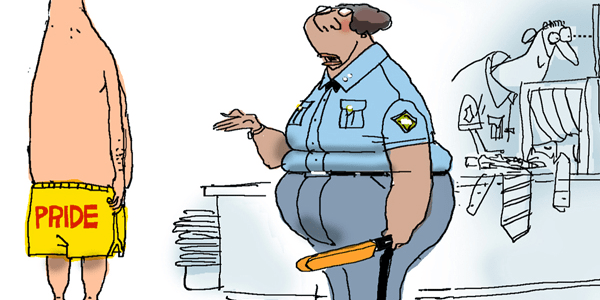With the economy slowly rebounding, 2011 was shaping up to be the best year for travel since the recession began. Prices were expected to rise only slightly, and people were making plans to take a long-postponed vacation.
But now that the Transportation Security Administration has introduced full-body scanners at many American airports, and subjected those who opt out of the machines to an "enhanced" pat-down, the 2011 outlook has changed, say travelers.
"I'm torn about whether I'll travel more next year or not," says Jeff Cohen, a stock trader from Austin, Texas. "I tend to go on a couple of large trips a year and was planning a major trip for the first half of 2011, to somewhere exotic. But the recent TSA crackdown has me rethinking that."
A new Consumer Travel Alliance poll suggests other travelers are, too.
A majority (46 percent) says they will travel "about the same" as they did this year. Slightly less than a third (30 percent) will travel more, while just less than a quarter (23 percent) will travel less. This contradicts several earlier surveys, which had predicted a significant upswing in travel next year.
Interviews with many of the would-be travelers suggest that concerns about the new body scanning procedures have tempered their once-ambitious 2011 travel plans.
"With the new TSA rules, I will probably do less travel in the U.S.," says Kathy Wilhelm, a retired software engineer from Cary, N.C.
The American travel industry is worried about the negative effects of the widely-criticized screening techniques. The U.S. Travel Association, a trade group for the American tourism industry, earlier this month launched a website, www.yourtravelvoice.org, to give travelers a chance to sound off about "appropriateness of various security policies."
"We need to hear ideas and experiences from travelers to better inform our discussions with policymakers and build a screening process that maximizes security while minimizing the burden on travelers," says Roger Dow, U.S. Travel's president.
The TSA insists it is listening to air travelers, and has already loosened many of its screening requirements in response to the public outrcy, including exempting pilots, flight attendants and children under 12 from the body scans or enhanced pat-downs. (Children will receive a "modified" pat-down, but the agency declines to say how, exactly, kids will be screened.)
The agency already has a long list of people who are either partially or completely exempt from airport screening, including senior government officials, law enforcement workers, members of the military, ambassadors, as well as ground staff, such as cargo loaders, baggage handlers, fuelers, cabin cleaners and caterers. It also reportedly turned off some body scanners on the Wednesday before Thanksgiving and the following Sunday — two of the busiest air travel days of the year — presumably to expedite the screening process.
But the government says screenings and pat-downs are necessary for most air travelers, and that it will not back down. And that's making some travelers turn down the opportunity to travel in 2011.
"I am too afraid of the TSA's groping to fly at all right now," says Sommer Gentry, a college professor in Baltimore. "Over the long term, I think this latest TSA outrage will change me from a 25-round-trips-per-year flyer to a far less frequent flier. I am desperately searching for alternatives to flying, and much of the time the alternative is going to be to simply stay home if driving or Amtrak aren't reasonable options."
Indeed, many 2011 itineraries will do their best to skip the TSA body scans.
Ernest Willyard, a retiree from Lovington, N.M., plans to take "a few more" trips next year, but he's avoiding the States. On the itinerary are Egypt, Syria, Vietnam, Cambodia, Thailand and Germany. "My big trips will be 30 days to Russia and 30 days to Iran," he says, "Providing the government does not prohibit it."
Merryl Gross, an engineer based in Boston, has shifted some of her travel to Amtrak in order to avoid the TSA. "That means my travel will take longer and possibly cost more, resulting in fewer trips," she says. "I'm fortunate in living in the Northeast where train travel is possible so perhaps I'll be able to achieve the same number of trips."
But the poll results could be interpreted in a different way. It's possible that the old 2011 travel forecasts were simply too optimistic, and that travelers would have pulled back anyway, with or without the TSA's help.
Some travelers say security screenings aren't a factor at all. Monica Lynn Kennedy, a sales manager in Stafford, Va., is brushing off TSA troubles and intends to travel more next year. She's planning to visit Orlando for a theme park vacation, a cruise on the new Disney Dream, and a visit to Florida's Space Coast. She plans to fly at least once, when she catches the cruise.
"It's only a 13-hour drive to Orlando," she says.
Travelers say they don't want to give up their long-anticipated 2011 vacations, which they've postponed for several years because of the economy. So while some are sticking to their current plans — for now, at least — they're doing their best to work around the system.
Liz Zollner, a college instructor from Tampa, plans to leave the country for her one-and-only vacation ("just like last year," she says). That way, she'll limit her exposure to the TSA.
"We could go more, but we just won't," she says, adding that maybe the TSA really wants people to fly less.
"Good job," she says. "It's working."
